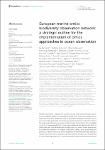European marine omics biodiversity observation network: a strategic outline for the implementation of omics approaches in ocean observation
| dc.contributor.author | Santi, I | |
| dc.contributor.author | Beluche, O | |
| dc.contributor.author | Beraud, M | |
| dc.contributor.author | Buttigieg, PL | |
| dc.contributor.author | Casotti, R | |
| dc.contributor.author | Cox, CJ | |
| dc.contributor.author | Cunliffe, M | |
| dc.contributor.author | Davies, N | |
| dc.contributor.author | de Cerio, OD | |
| dc.contributor.author | Exter, K | |
| dc.contributor.author | Kervella, AE | |
| dc.contributor.author | Kotoulas, G | |
| dc.contributor.author | Lagaisse, R | |
| dc.contributor.author | Laroquette, A | |
| dc.contributor.author | Louro, B | |
| dc.contributor.author | Not, F | |
| dc.contributor.author | Obst, M | |
| dc.contributor.author | Pavloudi, C | |
| dc.contributor.author | Poulain, J | |
| dc.contributor.author | Præbel, K | |
| dc.contributor.author | Vanaverbeke, J | |
| dc.contributor.author | Pade, N | |
| dc.date.accessioned | 2023-08-03T07:47:37Z | |
| dc.date.available | 2023-08-03T07:47:37Z | |
| dc.date.issued | 2023-05-18 | |
| dc.identifier.issn | 2296-7745 | |
| dc.identifier.issn | 2296-7745 | |
| dc.identifier.other | 1118120 | |
| dc.identifier.uri | https://pearl.plymouth.ac.uk/handle/10026.1/21146 | |
| dc.description.abstract |
<jats:p>Marine ecosystems, ranging from coastal seas and wetlands to the open ocean, accommodate a wealth of biological diversity from small microorganisms to large mammals. This biodiversity and its associated ecosystem function occurs across complex spatial and temporal scales and is not yet fully understood. Given the wide range of external pressures on the marine environment, this knowledge is crucial for enabling effective conservation measures and defining the limits of sustainable use. The development and application of omics-based approaches to biodiversity research has helped overcome hurdles, such as allowing the previously hidden community of microbial life to be identified, thereby enabling a holistic view of an entire ecosystem’s biodiversity and functioning. The potential of omics-based approaches for marine ecosystems observation is enormous and their added value to ecosystem monitoring, management, and conservation is widely acknowledged. Despite these encouraging prospects, most omics-based studies are short-termed and typically cover only small spatial scales which therefore fail to include the full spatio-temporal complexity and dynamics of the system. To date, few attempts have been made to establish standardised, coordinated, broad scaled, and long-term omics observation networks. Here we outline the creation of an omics-based marine observation network at the European scale, the European Marine Omics Biodiversity Observation Network (EMO BON). We illustrate how linking multiple existing individual observation efforts increases the observational power in large-scale assessments of status and change in biodiversity in the oceans. Such large-scale observation efforts have the added value of cross-border cooperation, are characterised by shared costs through economies of scale, and produce structured, comparable data. The key components required to compile reference environmental datasets and how these should be linked are major challenges that we address.</jats:p> | |
| dc.format.extent | 1118120- | |
| dc.publisher | Frontiers Media | |
| dc.subject | omics | |
| dc.subject | marine biodiversity | |
| dc.subject | ocean observation | |
| dc.subject | water column | |
| dc.subject | soft substrate | |
| dc.subject | hard substrate | |
| dc.subject | metagenomics | |
| dc.subject | metabarcoding | |
| dc.title | European marine omics biodiversity observation network: a strategic outline for the implementation of omics approaches in ocean observation | |
| dc.type | journal-article | |
| dc.type | Review | |
| plymouth.author-url | https://www.webofscience.com/api/gateway?GWVersion=2&SrcApp=PARTNER_APP&SrcAuth=LinksAMR&KeyUT=WOS:000999444200001&DestLinkType=FullRecord&DestApp=ALL_WOS&UsrCustomerID=11bb513d99f797142bcfeffcc58ea008 | |
| plymouth.volume | 10 | |
| plymouth.publication-status | Published online | |
| plymouth.journal | Frontiers in Marine Science | |
| dc.identifier.doi | 10.3389/fmars.2023.1118120 | |
| plymouth.organisational-group | |Plymouth | |
| plymouth.organisational-group | |Plymouth|Faculty of Science and Engineering | |
| plymouth.organisational-group | |Plymouth|Faculty of Science and Engineering|School of Biological and Marine Sciences | |
| plymouth.organisational-group | |Plymouth|REF 2021 Researchers by UoA | |
| plymouth.organisational-group | |Plymouth|Users by role | |
| plymouth.organisational-group | |Plymouth|Users by role|Academics | |
| plymouth.organisational-group | |Plymouth|REF 2021 Researchers by UoA|UoA07 Earth Systems and Environmental Sciences | |
| dcterms.dateAccepted | 2023-05-02 | |
| dc.date.updated | 2023-08-03T07:47:36Z | |
| dc.rights.embargodate | 2023-8-4 | |
| dc.identifier.eissn | 2296-7745 | |
| dc.rights.embargoperiod | forever | |
| rioxxterms.versionofrecord | 10.3389/fmars.2023.1118120 |


